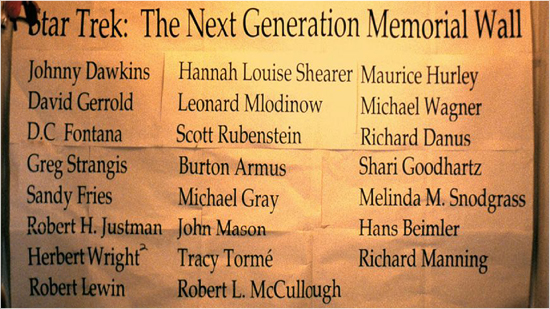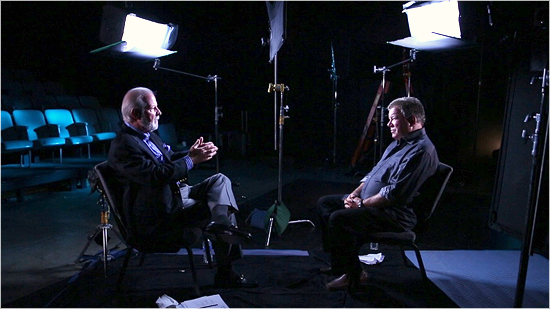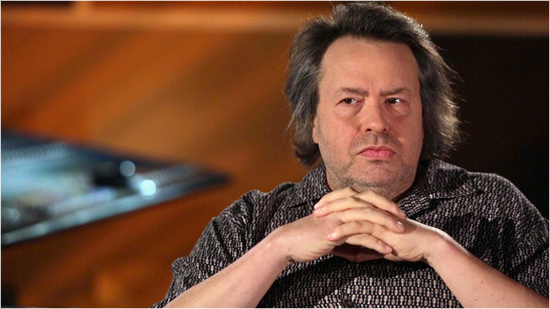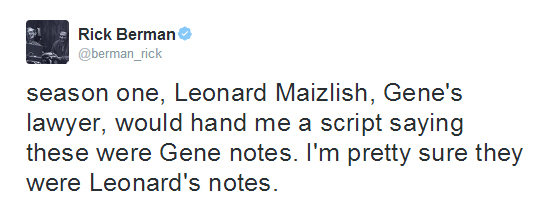By Justin Olson
About halfway through William Shatner Presents: Chaos on the Bridge, available now to rent or buy on Vimeo, we’re told that so many writers had been chewed up and spit out of the Star Trek: The Next Generation meat grinder at Paramount in its first year that by season three an In Memoriam poster was affixed on the bathroom wall next to the writers’ offices in the Hart building with the names of their dearly departed fellow scribes.
[iframe src=”https://player.vimeo.com/video/131812876″]
It is certainly ironic that, for a show which espoused a utopian 24th century ideal for humanity wherein interpersonal conflicts had largely disappeared, the reality behind the scenes within the TNG production offices in the 20th century was very much the opposite. And honestly, who needs Klingons, Romulans, and Borg when you’ve got a real life villain like Leonard Maizlish?
But more on that guy in a second.

Right off the bat, Shatner’s documentary presents us with a Gene Roddenberry who was a hot mess of contradictions, sometimes kind, sometimes cruel, a very flawed human being. He was decades past his prime, a has-been trying desperately to do whatever he could to take Star Trek back and make it his own again after having been screwed on the Original Series. Now, 20 years later, he was being given another chance following the box office success of Star Trek IV: The Voyage Home.
In order to do this, according to writer David Gerrold, Gene Roddenberry had to be shipped off to an alcohol and drug treatment facility by his wife Majel Barrett Roddenberry. And over the course of several months he sobered up, just in time to begin conceptualizing what the show would later become in his offices on the studio lot. Good thing she was looking out for him too, because as former Paramount Network Television president John Pike points out several minutes in, he needed Gene, and the studio couldn’t go forward with the series without Roddenberry’s involvement.
Enter Leonard Maizlish, Esq., Roddenberry’s cutthroat attorney. In negotiations with Paramount while Gene was busy sobering up, Maizlish was able to get Gene and himself a substantial compensation package worth tens of millions. While Paramount would retain ownership of Star Trek itself, Roddenberry would have free reign to create his new television show.

Almost immediately, Roddenberry brought in the very same people he had trusted and worked with on the Original Series: producers Eddie Milkis and Bob Justman, as well as writers David Gerrold and Dorothy Fontana. Gerrold would flesh out the world and characters and write the writer’s bible (which he did) and Fontana would pen the one-hour pilot episode, originally titled, “Meeting at Farpoint.” (Roddenberry would eventually expand Fontana’s one-hour pilot teleplay into a two-hour at the studio’s behest by adding the character Q and his humanity-on-trial subplot.)
The problem was, to virtually everyone’s else’s chagrin, Maizlish stuck around and became, as David Gerrold has put it elsewhere, Gene’s self-appointed chief of staff, his most trusted adviser. In other words, Gene’s Grima Wormtongue; his Iago.
All the creative decisions, in one way or another, ended up being filtered through this lawyer who didn’t have a creative bone in his vampiric body. He snuck around the offices, peeked in people’s desk drawers, read stuff on their computers, eavesdropped on conversations in the hallway, you name it.
Worst of all, he full-on re-wrote early TNG scripts in Gene’s name, deliberately violating Writer’s Guild rules. If you had wondered why some of the scenes and dialogue in the first season were sometimes inexplicably, inexcusably, atrociously bad, well, there’s your answer!
Maizlish’s meddling caused a mass writer/producer exodus from the show, but justice eventually prevailed and he was fired from whatever made up position he had invented for himself and banished from the Paramount lot. Though amazingly, as we’re told moments later, he tried to sneak back in on several occasions and continue his devious machinations! The guy definitely had chutzpah, that’s for sure.
In retrospect, it’s amazing that the show survived this early internal power struggle, both creatively and financially. It’s a testament to the quality of the core concept of Star Trek itself, and the strong work that Gerrold, Fontana, and the rest of the staff of actual professional writers were able to accomplish before they abandoned ship. And, as Ronald D. Moore points out, it’s a testament to the audience for sticking with those creaky, half-baked, embryonic years.
When the smoke cleared, essentially the only writer-producer left standing in the smoldering rubble was Maurice Hurley, who would go on to run the show in its second season after a protracted Writer’s Guild strike delayed production.
In fact, the central bulk of the documentary centers on Hurley — in his first on-camera interview since 1988’s From One Generation to the Next — and offers his take on the material, and his disagreements and arguments with Gene.
Ultimately, Hurley’s stewardship of the show was one step forward, two steps back.
https://www.youtube.com/watch?v=LpJaW0TwdVo
It wasn’t until Michael Piller came on board in season three that things really started to coalesce and change for the better. Piller coming in only occupies perhaps the last ten minutes of Shatner’s documentary. Probably because, while there were still personality conflicts behind the scenes, there was nothing even approaching the outrageous goings on in those first two seasons.
For the behind the scenes uninitiated, Shatner’s documentary is fun to watch, well produced, briskly paced, and filled with cheeky animated recreations of events spoken about by the panoply of talking heads. It’s kind of like the Cliffs Notes version of TNG’s creation. I’m sure Shatner has hours and hours of more material he could have presented here (it could’ve easily been feature-length) but as it is, it works.
The highlights of this hour-long special are the interviews with Maurice Hurley, who died earlier this year, and Tracy Tormé, one of the key writers from seasons one and two of TNG who actually did good solid work despite all the Maizlish mishegoss. I mean, the guy created Picard’s alter ego, Dixon Hill. You could probably write an entire movie with Patrick Stewart playing Picard playing Dixon Hill!

As for Shatner himself, he very wisely refrains from inserting himself into the narrative, save for one brief moment when an interview subject asked for his reaction to learning about a “new” Star Trek show that wouldn’t have Captain Kirk at the helm. He asks insightful questions, and allows the cast of interviewees to speak at length without interruption.
In closing, if you’ve read much of the behind the scenes material available, and have seen all the Star Trek: The Next Generation special features like I have, from the 2002 DVD releases on up through the 2012 Blu-ray sets (Roger Lay, Jr.’s and Robert Meyer Burnett’s new HD docs are the most comprehensive recounting of the making of the show you will find anywhere), a lot of what you see here is familiar territory, especially anytime an actor is giving an anecdote.
The one storytelling moment that was new to me was Patrick Stewart’s tale recounting his reaction to the Good Morning America crew’s visit to the TNG sets, leading to a tense meeting with John Pike — and explaining his absence from one of the most popular videos on our YouTube channel.
https://www.youtube.com/watch?v=FfkMqi0Geus
What I would most like to see down the line is a Blu-ray with extended interviews, especially with Hurley and Tormé, who did not participate in the TNG Blu-ray interviews. That would go very nicely next to my TNG Complete Series set.
Hint, hint, Mr. Shatner.

